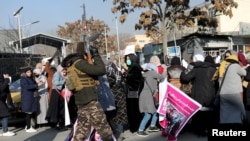A small group of female activists staged a protest rally in the Afghan capital, Kabul, Sunday, demanding that Taliban authorities reopen schools and universities for girls nationwide.
Protesters marched through the city's western Pol-e Sokhta neighborhood before being forcefully dispersed by Taliban security forces.
Around 25 women and girls attended the demonstration, carrying placards and chanting slogans "freedom, work, education," "wise mother strong nation," and "education is our right,” organizers said.
Secondary schools for boys reopened this past week across the country after winter break, but the Taliban did not allow girls to return to classes despite international denunciation of the education ban and calls for lifting it.
The Taliban closed secondary schools for teenage girls since taking control of Afghanistan in 2021. Last December, they barred female students from attending universities, making Afghanistan the only country where women cannot receive an education.
The hardline rulers recently also banned female employees of nongovernmental organizations from workplaces after restricting most women government employees from returning to work.
Catherine Russell, the UNICEF executive director, in a statement at the start of the new school year last week, urged the Taliban to allow all girls to resume classes with immediate effect, saying excluding them from learning will have far-reaching consequences for the country's already turbulent economy and health system.
"This unjustified and shortsighted decision has crushed the hopes and dreams of more than 1 million girls and marks another grim milestone in the steady erosion of girls' and women's rights nationwide," Russell said. "Girls across Afghanistan have been denied their right to learn for over three years – first, due to COVID-19, and then because of the ban on attending secondary school."
UNICEF tweeted a video Sunday underscoring the importance of educating Afghan girls. It shows 15-year-old Zahra lamenting she would have been in the 10th grade this year if schools were open.
"If schools do not open, then I will not have any hope for life," she said. "I cannot achieve my dream of becoming a doctor, and I am deprived of my right to education."
Torek Farhadi, a former Afghan official and political commentator, said the Taliban's refusal to respect women's right to education had discouraged major donors and partners of Afghanistan.
"More and more families are considering immigrating out of the country. While the Taliban deprive girls of getting an education, the message from Islamic countries and Afghanistan’s neighbors has been clear: we can't recognize your government," Farhadi said.
The Taliban have implemented their strict interpretation of Islamic law. They defend their governance, saying it is in line with Afghan culture and religious beliefs. Many Afghans and scholars in the rest of the Islamic world dispute the claims, however.
The former insurgent group seized power in August 2021 as the United States and NATO troops departed the country, but the world has not formally recognized the legitimacy of the de facto rulers over human rights concerns, especially the treatment of women.
The Taliban previously controlled Afghanistan from 1996 to 2001 when women's access to education and work was entirely banned.





